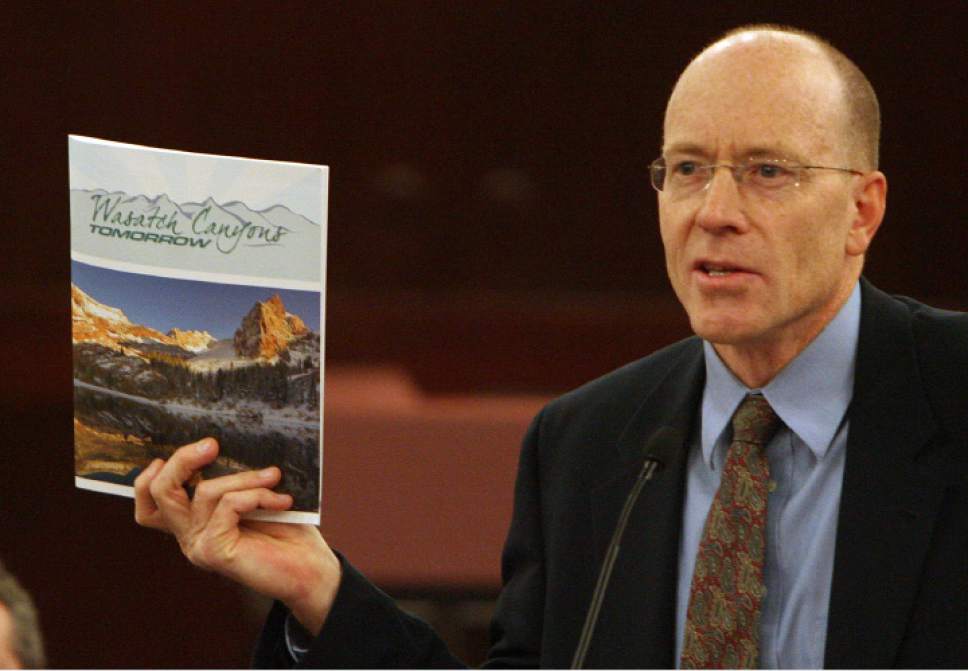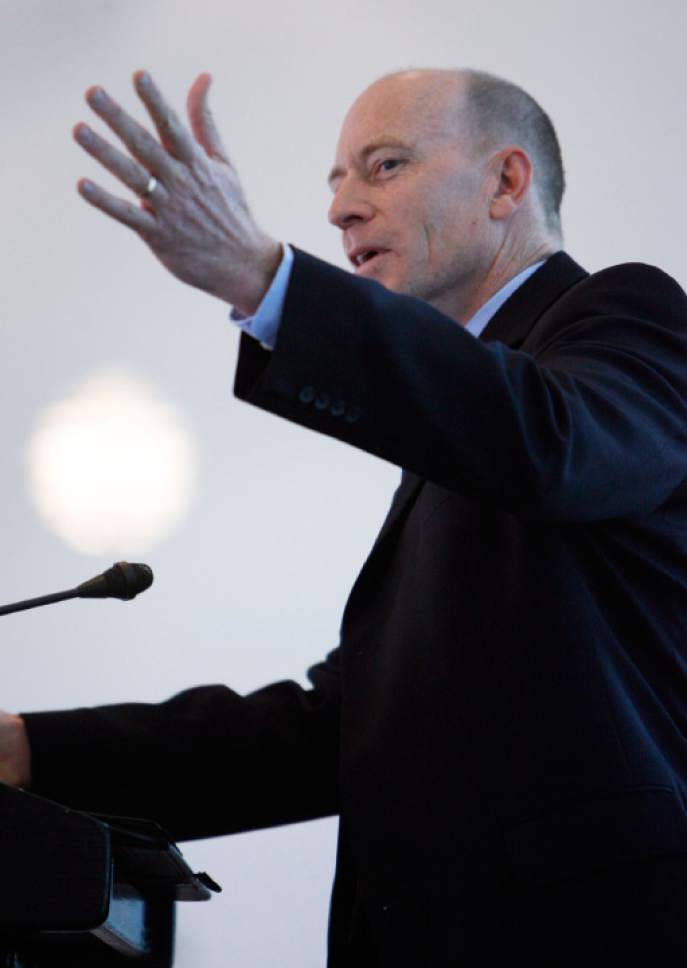This is an archived article that was published on sltrib.com in 2015, and information in the article may be outdated. It is provided only for personal research purposes and may not be reprinted.
Alan Matheson figures his undergraduate degree in international relations will serve him well in his new job as director of the Utah Department of Environmental Quality.
"I know people are passionate about matters of the environment. By some degree, I'm being thrown into a cauldron of controversy," Matheson said Monday, moments after Gov. Gary Herbert announced his nomination to succeed Amanda Smith as the state's top environmental regulator.
"I think some of the lessons I learned in diplomacy — solving the Mideast crises and the Cold War — might translate into this position."
After six years as the state's leading environmental watchdog, Smith steps down May 22 to pursue opportunities in the private sector.
Herbert said Matheson, his environmental adviser, was the obvious choice to continue Smith's style of resolving contentious issues through collaboration.
"He knows he has big shoes to fill. I believe he has big enough feet to do the job," the governor said. "He has a tremendous depth and breadth in his own life.
"His interest is in finding collaborative ways for all interested parties to work together in cooperation and find the right solutions and the proverbial win-win," Herbert added. "Alan is the right person at the right time to take the DEQ and move it forward."
Matheson's appointment is subject to state Senate confirmation.
Herbert first plucked Matheson from the Envision Utah growth-planning think tank in 2011 to provide insight in the governor's office on thorny issues including public lands, air quality and oil and gas development.
"The opportunity to work on your staff has been the highlight of my career," Matheson told Herbert. "If you let me go fishing once in a while, it would have been perfect."
Matheson, a father of three adult children, still won't have much time for fishing as he shifts over to head a 378-employee state agency responsible for monitoring air and water quality and regulating the industries that impact them and process various wastes. DEQ has a budget of $57 million.
"I recognize very clearly that clean air, clean water, healthy landscapes are foundational to so many of the things we want to do and are doing in our state," Matheson said. They are "critical for our health and health of our families, important to our economy, being able to attract the best and the brightest workers, stimulate this tourism industry that is so important for our state, maintain a solid regulatory environment and also the quality of life and the enjoyment of life that brings so many to our state."
In tapping Matheson, Herbert chose a figure well-known to lawmakers and respected by environmental advocates and industry representatives alike.
"Based on Alan's background, he is well-qualified to lead the DEQ and work with all parties to collaboratively address the environmental priorities in the state of Utah," said Kennecott Utah Copper spokesman Kyle Bennett. "As a regulated entity, we have a responsibility to work with our regulators and we will continue to do that."
Matheson knows full well what a hot pot Utah's environmental debates can be. He was a key figure behind DEQ's proposal to ban word burning all winter long to help reduce particulate air pollution along the Wasatch Front.
Hundreds of angry residents testified against the idea at several public hearings and legislators intervened with a ban of their own: No seasonal bans on wood burning.
Environmentalists appreciated Matheson's willingness to hear their concerns and ideas for improving environmental quality.
HEAL Utah Director Matt Pacenza said he was pleased by Matheson's selection. "It feels like a continuation of current leadership," Pacenza said. "He is always willing to meet and is a good listener."
And Sierra Club veteran Tim Wagner, who now leads Utah Physicians for a Healthy Environment, said he looks forward to continuing to work with Matheson.
"I've known Alan for many years and have come to respect him for his desire and ability to listen to all sides while also having a deep appreciation for Utah's amazing landscapes and our sensitive environments," Wagner said.
Smith's six-year tenure at the department was marked by some of the most pressing environmental challenges facing the state, including EnergySolutions' plan to bury up to 700,000 tons of depleted uranium in Tooele County, the proposed-and-retracted burning ban and a disastrous oil spill into Salt Lake City's Red Butte Creeek.
Now, Matheson will step into the balancing act.
The founding director of Trout Unlimited's Utah Water Project, Matheson has been a partner in a Phoenix law firm, as well as a senior attorney and environmental policy adviser for Arizona's largest electric utility. He led Envision Utah for seven years.
Matheson earned a bachelor's in international relations from Stanford University and a law degree from UCLA School of Law.
Smith thanked Matheson for taking the reins.
"If I have a charge to you, it's to continue to engage all parties in the discussion, but also assure the staff that it continues to be valued and developed," Smith said. "The big issue facing the department is we have a huge number of people who are going to retire in the next 10 years.
"We have to look at how to keep good people working for the state, because the issues are difficult and the degree of professionalism and education is high."
Smith, a former Nature Conservancy attorney, was hailed as a superb collaborator and "peacemaker." Then-Gov. Jon Huntsman Jr. tapped Smith, his legislative director, in 2009 to replace Rick Sprott as the state's top environmental regulator.
Herbert said Smith made the department, more efficient by removing bureaucratic roadblocks, which he believes improved environmental protection. Its six divisions will be reduced to five next month when the divisions of Radiation Control and Solid and Hazardous Waste are merged.





